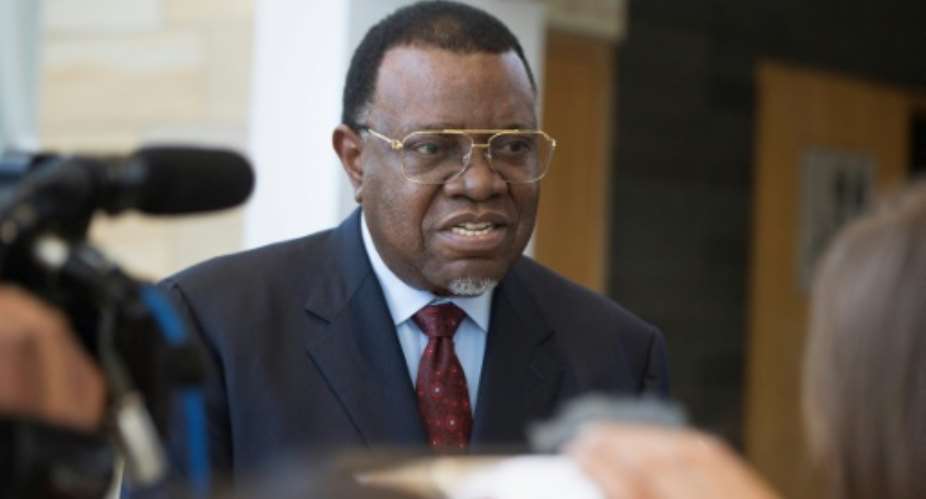Namibia's President Hage Geingob on Friday looked set to secure a second term with partial results from this week's general election showing him leading with 55 percent of the vote.
The southwestern African country held its sixth presidential and parliamentary elections on Wednesday amid economic woes and growing frustration against the regime.
Geingob's South West Africa People's (SWAPO) party has been in power since Namibia's independence from South Africa in 1990, and is widely hailed for its role in the liberation struggle.
But the president -- who was elected with a sweeping 87 percent majority in 2014 -- is predicted to lose a share of votes to a breakaway SWAPO member running as an independent candidate, former dentist Panduleni Itula.
The breakaway candidate is particularly popular among youth frustrated by the lack of jobs and too young to remember the SWAPO-led war for independence.
Partial results published by the Electoral Commission of Namibia after half the votes were counted showed Geingob leading with 55.04 percent, followed by Itula with 29.72 percent.
SWAPO was also ahead in parliament with 65.57 percent of votes.
The party's long-standing opponent, the Popular Democratic Movement (PDM), was in second place with 15.6 percent.
PDM candidate and second-time runner McHenry Venaani was third in the presidential race with 5.17 percent of votes.
Election commission chief Theo Mujoro said a date for the announcement of final results would be determined on Friday afternoon.
Around 1.4 million of Namibia's 2.45 million population were registered to vote. Half were under 37 and around a third born after 1990.
The election was "generally peaceful, well organised and conducted in a professional manner," the Southern African Development Community (SADC) regional bloc said Friday.
Namibia was the first country in Africa to introduce electronic voting machines in 2014.
The machines -- opposed by opposition parties fearing the lack of paper could facilitate fraud -- were meant to accelerate the voting and counting process.
But the voting process was painfully sluggish and had people queueing outside for hours.
SADC recommended better training and "voter education" around the use of these machines.





 NPP Performance Tracker prioritise toilets over substantive infrastructure dev’t...
NPP Performance Tracker prioritise toilets over substantive infrastructure dev’t...
 Ghana, other election bound-countries must build fiscal buffers – IMF admonishes
Ghana, other election bound-countries must build fiscal buffers – IMF admonishes
 Parliament reconvenes late May, denies Speaker Bagbin delaying recall over NDC t...
Parliament reconvenes late May, denies Speaker Bagbin delaying recall over NDC t...
 $100m needed to revitalise Ghana's poultry sector — GNAPF
$100m needed to revitalise Ghana's poultry sector — GNAPF
 Driver arrested for causing train collision on Tema-Mpakadan Railway Line
Driver arrested for causing train collision on Tema-Mpakadan Railway Line
 Police grab trucker for Tema-Mpakadan rail accident
Police grab trucker for Tema-Mpakadan rail accident
 Gov't plans to revise traditional customs following Gborbu child marriage
Gov't plans to revise traditional customs following Gborbu child marriage
 Franklin Cudjoe fumes at unaccountable wasteful executive living large at the ex...
Franklin Cudjoe fumes at unaccountable wasteful executive living large at the ex...
 I'll 'stoop too low' for votes; I'm never moved by your propaganda — Oquaye Jnr ...
I'll 'stoop too low' for votes; I'm never moved by your propaganda — Oquaye Jnr ...
 Kumasi Thermal Plant commissioning: I pray God opens the eyes of leaders who don...
Kumasi Thermal Plant commissioning: I pray God opens the eyes of leaders who don...
